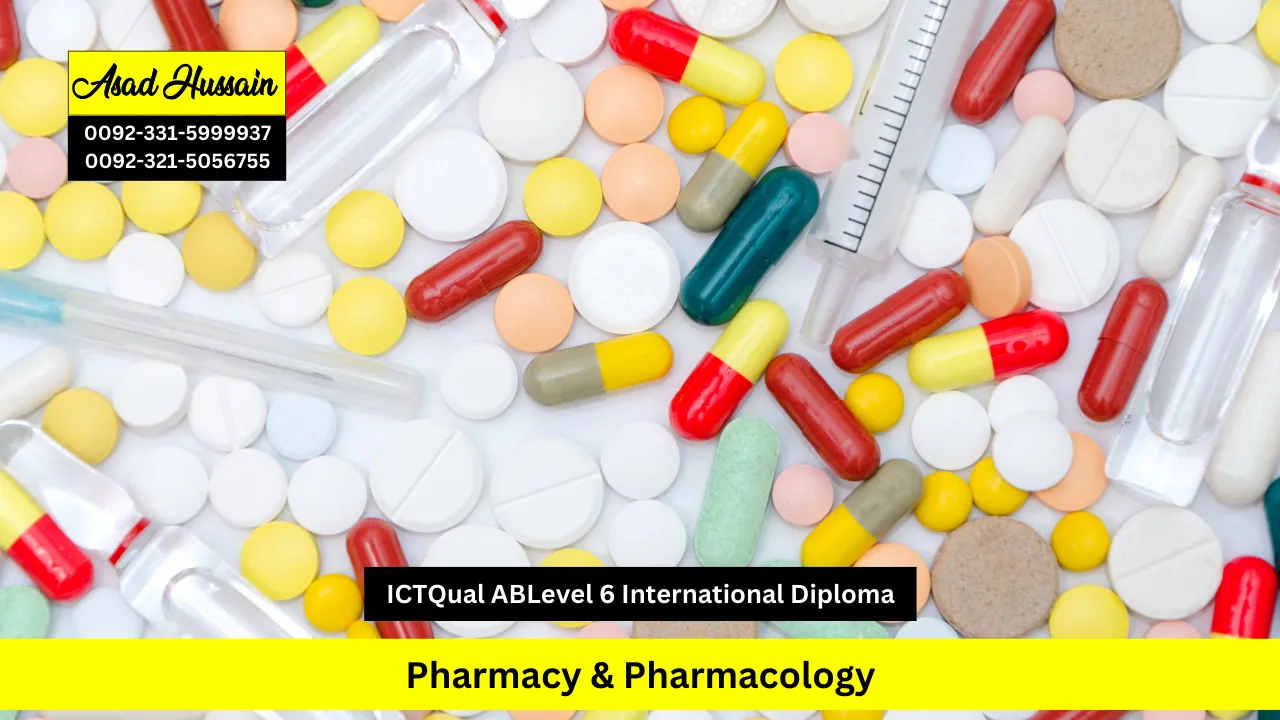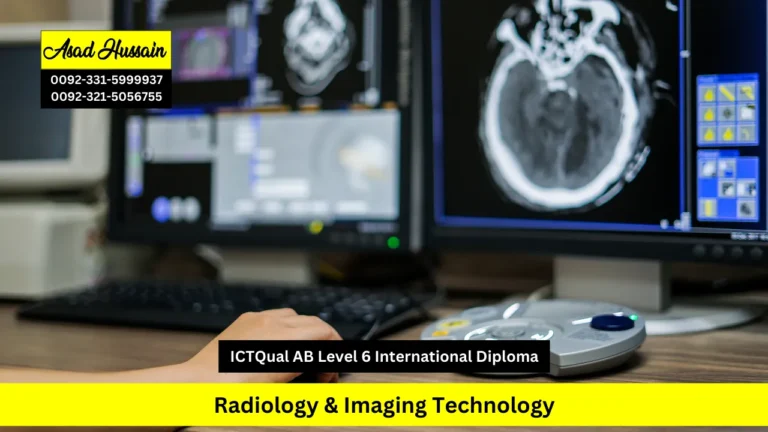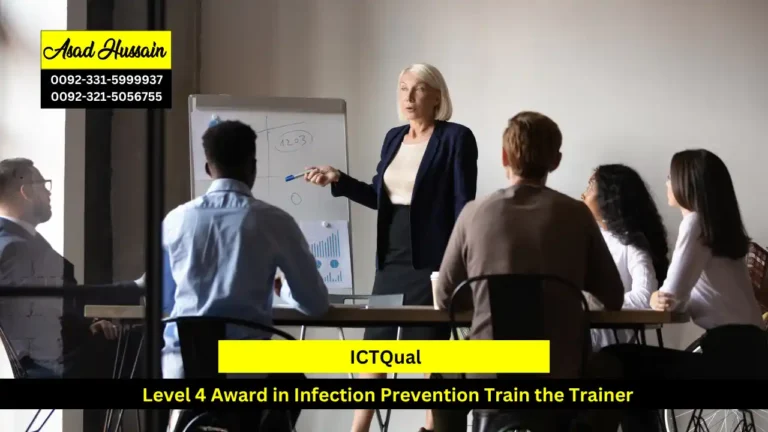The pharmaceutical industry plays a critical role in advancing global healthcare, ensuring safe and effective treatment for diverse medical conditions. The ICTQual AB Level 6 International Diploma in Pharmacy & Pharmacology is designed to provide learners with advanced knowledge and applied skills in the science of drugs, their therapeutic uses, and their impact on human health. ICTQual AB Level 6 International Diploma in Pharmacy & Pharmacology bridges theory with practice, preparing learners to excel in pharmaceutical practice, research, and clinical care.
The scope of the ICTQual AB Level 6 International Diploma in Pharmacy & Pharmacology covers key areas such as pharmacological principles, drug formulation, clinical pharmacology, pharmaceutical chemistry, and patient-centered care. Learners will explore the safe administration of medicines, pharmacovigilance, regulatory compliance, and evidence-based healthcare practices. By integrating practical laboratory techniques with professional knowledge, the program builds competencies essential for both pharmacy operations and pharmaceutical research.
Upon completion, graduates will be equipped with the ability to critically analyze drug mechanisms, ensure medication safety, and contribute to the development of healthcare solutions. ICTQual AB Level 6 International Diploma in Pharmacy & Pharmacology not only enhances employability in hospitals, community pharmacies, research organizations, and pharmaceutical industries but also serves as a stepping stone toward postgraduate studies and leadership roles in pharmacy and healthcare.
Program Highlights
Study Units
Year 1: Foundation of Pharmacy and Life Sciences
- Introduction to Pharmacy and Pharmacology
- Human Anatomy and Physiology
- Principles of Biochemistry
- Fundamentals of Microbiology
- Basic Pharmaceutical Chemistry
- General Pharmacology
- Pharmaceutical Calculations
- Introduction to Pathophysiology
- Communication Skills in Healthcare
- Health and Safety in Pharmacy Practice
- Pharmaceutical Dosage Forms
- Academic and Research Skills
Year 2: Intermediate Knowledge and Applications
- Organic and Medicinal Chemistry
- Pharmacokinetics and Pharmacodynamics
- Advanced Pharmacology
- Immunology and Biotechnology in Pharmacy
- Pharmaceutics and Drug Formulation
- Analytical Techniques in Pharmacy
- Pharmacognosy and Natural Products
- Clinical Biochemistry
- Hospital and Community Pharmacy Practice
- Drug Legislation and Ethics
- Epidemiology and Public Health
- Research Methods in Pharmacy
Year 3: Advanced Specialisation and Professional Practice
- Advanced Pharmacotherapy
- Clinical Pharmacy and Patient Care
- Toxicology and Safety Pharmacology
- Advanced Pharmaceutics and Novel Drug Delivery Systems
- Biotechnology and Biopharmaceuticals
- Advanced Pharmaceutical Analysis
- Regulatory Affairs and Quality Assurance
- Pharmacovigilance and Drug Safety
- Global Trends in Pharmacy and Pharmacology
- Professional Practice and Leadership in Pharmacy
- Research Project / Dissertation
- Continuing Professional Development and Career Skills
These entry requirements ensure that learners possess the academic background, skills, and communication ability to succeed in the ICTQual AB Level 6 International Diploma in Pharmacy & Pharmacology and progress confidently in their professional or academic journey.
Age Requirements
- Learners must be at least 18 years of age at the time of enrollment.
- Applicants are expected to demonstrate maturity and commitment suitable for advanced-level study.
Educational Requirements
- A Level 5 Diploma or equivalent qualification in Pharmacy, Pharmacology, or a related healthcare/medical field.
- Candidates with relevant science backgrounds (such as Biology, Chemistry, or Health Sciences) may also be considered.
Professional Experience
- Prior work experience in a pharmacy, clinical, or healthcare environment is desirable but not mandatory.
- Candidates with professional exposure to healthcare operations or drug safety protocols will have an added advantage.
English Language Proficiency
- Applicants must demonstrate English language proficiency to effectively engage with the course material.
- This can be shown through a recognized English language qualification or equivalent prior education in English.
The ICTQual AB Level 6 International Diploma in Pharmacy & Pharmacology equips learners with a comprehensive blend of theoretical knowledge, practical skills, and professional competencies essential for modern pharmacy and healthcare practice. ICTQual AB Level 6 International Diploma in Pharmacy & Pharmacology progressively develops foundational, intermediate, and advanced expertise, ensuring learners are prepared for clinical, research, and pharmaceutical leadership roles.
Year 1: Foundation of Pharmacy and Life Sciences
Introduction to Pharmacy and Pharmacology
- Understand the role and scope of pharmacy and pharmacology in healthcare.
- Describe fundamental drug classifications and mechanisms of action.
- Demonstrate basic application of pharmacological principles in clinical contexts.
Human Anatomy and Physiology
- Explain the structure and function of major human body systems.
- Relate physiological processes to drug actions and pharmacological responses.
- Apply anatomical knowledge in patient assessment and healthcare practice.
Principles of Biochemistry
- Understand biochemical pathways relevant to drug metabolism.
- Analyse enzyme-catalysed reactions and their clinical significance.
- Apply biochemistry concepts in pharmaceutical formulation and therapy.
Fundamentals of Microbiology
- Identify pathogenic microorganisms and their impact on human health.
- Demonstrate aseptic techniques and laboratory microbiology skills.
- Apply microbiological principles to infection control and pharmacy practice.
Basic Pharmaceutical Chemistry
- Describe chemical properties of drugs and excipients.
- Apply principles of chemical stability and solubility to formulation.
- Conduct basic laboratory experiments safely and accurately.
General Pharmacology
- Explain drug mechanisms, therapeutic effects, and side effects.
- Relate pharmacological concepts to patient care scenarios.
- Demonstrate knowledge of dose-response relationships.
Pharmaceutical Calculations
- Perform accurate calculations for drug dosages, concentrations, and dilutions.
- Apply mathematical principles to pharmaceutical compounding.
- Ensure safe and effective medication administration.
Introduction to Pathophysiology
- Explain disease mechanisms and their clinical manifestations.
- Relate pathophysiological processes to pharmacological interventions.
- Integrate disease knowledge in patient assessment and care planning.
Communication Skills in Healthcare
- Demonstrate effective communication with patients and healthcare teams.
- Apply counselling techniques for safe and informed medication use.
- Enhance teamwork and collaborative practice in pharmacy settings.
Health and Safety in Pharmacy Practice
- Implement safety protocols in laboratory and clinical environments.
- Identify and mitigate occupational hazards in pharmacy.
- Promote a culture of health, safety, and compliance.
Pharmaceutical Dosage Forms
- Describe various dosage forms and their clinical applications.
- Understand formulation principles for oral, topical, and parenteral drugs.
- Apply knowledge to optimise drug delivery and patient adherence.
Academic and Research Skills
- Develop critical thinking and scientific writing skills.
- Conduct literature reviews and basic research projects.
- Apply evidence-based practices in pharmacy and healthcare.
Year 2: Intermediate Knowledge and Applications
Organic and Medicinal Chemistry
- Analyse chemical structures and their pharmacological relevance.
- Apply medicinal chemistry principles to drug design and development.
- Conduct laboratory experiments in synthesis and analysis of compounds.
Pharmacokinetics and Pharmacodynamics
- Explain absorption, distribution, metabolism, and excretion of drugs.
- Evaluate dose-response relationships and therapeutic indices.
- Apply pharmacokinetic data to optimise patient therapy.
Advanced Pharmacology
- Analyse mechanisms of action of advanced therapeutics.
- Assess drug interactions, contraindications, and adverse effects.
- Apply pharmacology in clinical case studies and patient care planning.
Immunology and Biotechnology in Pharmacy
- Understand immune system functions and applications in therapeutics.
- Describe biotechnological drugs and their clinical use.
- Apply immunology concepts in vaccine development and immunotherapy.
Pharmaceutics and Drug Formulation
- Develop knowledge of formulation science and dosage design.
- Apply excipient selection, stability, and delivery systems principles.
- Conduct formulation experiments for safe and effective drug delivery.
Analytical Techniques in Pharmacy
- Perform qualitative and quantitative analyses of pharmaceutical compounds.
- Use chromatographic, spectroscopic, and titrimetric methods effectively.
- Evaluate results for quality control and regulatory compliance.
Pharmacognosy and Natural Products
- Identify medicinal plants and their bioactive compounds.
- Analyse natural products for therapeutic applications.
- Integrate phytopharmaceutical knowledge into evidence-based practice.
Clinical Biochemistry
- Interpret biochemical markers relevant to disease and therapy.
- Apply laboratory data in clinical decision-making.
- Correlate biochemical findings with pharmacological interventions.
Hospital and Community Pharmacy Practice
- Demonstrate patient care and medication management in clinical settings.
- Apply ethical and legal standards in pharmacy practice.
- Develop problem-solving skills for real-world pharmaceutical scenarios.
Drug Legislation and Ethics
- Understand national and international pharmaceutical regulations.
- Apply ethical frameworks in clinical and research practice.
- Ensure compliance with professional standards and legal requirements.
Epidemiology and Public Health
- Analyse patterns of disease and medication use in populations.
- Apply epidemiological principles to clinical decision-making.
- Support public health initiatives and preventive medicine strategies.
Research Methods in Pharmacy
- Design, conduct, and analyse pharmacy-related research projects.
- Apply statistical methods to interpret experimental data.
- Integrate research findings into clinical practice and drug development.
Year 3: Advanced Specialisation and Professional Practice
Advanced Pharmacotherapy
- Design personalised therapeutic plans for complex diseases.
- Evaluate clinical outcomes and optimise drug therapy.
- Apply evidence-based guidelines in specialised patient care.
Clinical Pharmacy and Patient Care
- Demonstrate advanced patient assessment and counselling skills.
- Monitor therapy effectiveness and manage adverse drug reactions.
- Integrate clinical knowledge into multidisciplinary healthcare teams.
Toxicology and Safety Pharmacology
- Analyse toxic effects and safety profiles of drugs.
- Apply risk assessment methods for safe medication use.
- Conduct pharmacovigilance and monitoring activities.
Advanced Pharmaceutics and Novel Drug Delivery Systems
- Develop knowledge of controlled release, nanotechnology, and targeted delivery.
- Apply formulation strategies for improved bioavailability.
- Evaluate clinical effectiveness of novel pharmaceutical systems.
Biotechnology and Biopharmaceuticals
- Understand production and application of recombinant proteins and biologics.
- Analyse therapeutic use of biopharmaceuticals in patient care.
- Integrate biotechnology innovations into clinical pharmacy practice.
Advanced Pharmaceutical Analysis
- Perform high-level qualitative and quantitative analyses of complex formulations.
- Apply analytical data for regulatory submissions and quality assurance.
- Troubleshoot analytical procedures in laboratory settings.
Regulatory Affairs and Quality Assurance
- Implement regulatory guidelines in drug development and clinical practice.
- Conduct quality assurance and compliance audits.
- Ensure adherence to international standards in pharmaceutical manufacturing.
Pharmacovigilance and Drug Safety
- Monitor, evaluate, and report adverse drug reactions.
- Implement strategies to improve patient safety.
- Integrate pharmacovigilance principles into clinical and research practice.
Global Trends in Pharmacy and Pharmacology
- Analyse emerging pharmaceutical technologies and innovations.
- Evaluate global healthcare policies impacting pharmacy practice.
- Apply international best practices in clinical and industrial settings.
Professional Practice and Leadership in Pharmacy
- Develop leadership and management skills in healthcare and pharmaceutical teams.
- Apply ethical decision-making in professional practice.
- Plan and lead projects to improve pharmacy services.
Research Project / Dissertation
- Conduct an independent research project in pharmacy or pharmacology.
- Apply scientific methodology, data analysis, and critical evaluation.
- Present findings in a professional and academically rigorous format.
Continuing Professional Development and Career Skills
- Identify opportunities for lifelong learning in pharmacy and pharmacology.
- Develop career planning, networking, and professional growth strategies.
- Prepare for advanced roles in clinical, research, or regulatory pharmacy sectors.
Upon completing this programme, learners will be fully equipped with advanced theoretical knowledge, practical competencies, research skills, and professional expertise necessary to excel in hospital, community, industrial, and research pharmacy roles, both nationally and internationally.
The ICTQual AB Level 6 International Diploma in Pharmacy & Pharmacology is designed for individuals passionate about advancing their knowledge and careers in healthcare, pharmaceuticals, and scientific research. It attracts learners from diverse academic and professional backgrounds who share an interest in drug development, patient safety, and clinical practice.
Educational Instructors and Trainers
- Professionals in healthcare or science education seeking to expand their expertise in pharmacology and pharmacy practices.
- Trainers aiming to deliver up-to-date pharmaceutical knowledge to students and healthcare teams.
Environmental Advocates and Activists
- Individuals interested in the environmental impact of pharmaceutical production and drug disposal.
- Advocates promoting sustainable practices in pharmaceutical industries.
Students and Recent Graduates
- Learners with a background in biology, chemistry, healthcare, or related sciences who wish to specialize in pharmacy and pharmacology.
- Graduates aiming to gain industry-relevant qualifications to enhance employability.
Career Changers
- Professionals from healthcare or related fields transitioning into pharmacy and pharmacology.
- Individuals seeking new career opportunities in pharmaceutical industries, research labs, or clinical settings.
Policy Makers and Regulators
- Government or organizational professionals involved in pharmaceutical policy-making and regulatory frameworks.
- Stakeholders ensuring compliance with international drug safety and healthcare standards.
ICTQual AB Level 6 International Diploma in Pharmacy & Pharmacology is ideally suited for motivated learners who want to make a meaningful impact in healthcare and pharmaceuticals. Whether pursuing academic growth, career advancement, or contributing to policy and sustainability, learners will benefit from the program’s balance of scientific depth, professional relevance, and global recognition.







